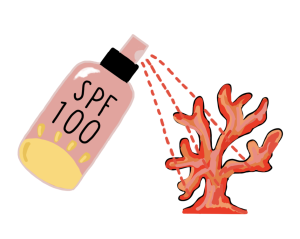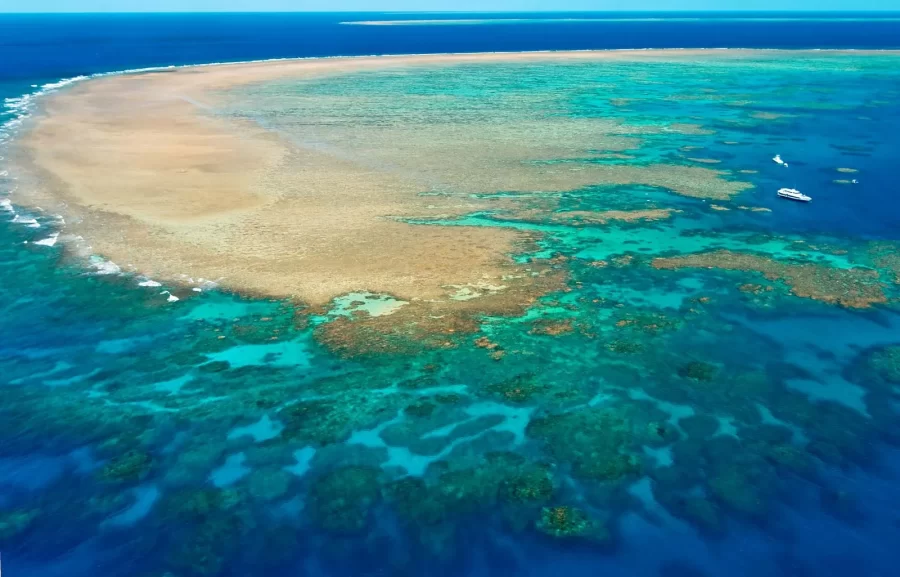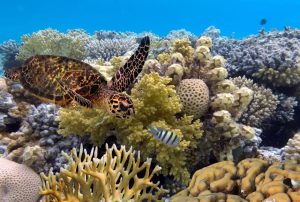The struggles and importance of coral reefs
An aerial view of the Great Barrier Reef.
December 13, 2022
From outer space, there is only one structure created by living creatures that can be seen by the naked eye: the Great Barrier Reef off the coast of Queensland, Australia. While from space the reef looks like a massive, lightly colored mass compared to the dark surrounding ocean, in person the coral displays bright colors and a thriving ecosystem. However, the wonders of the Great Barrier Reef are at great risk of disappearing from Earth forever along with thousands of other reefs spotting our oceans. The incredible blues, reds, oranges and greens are quickly fading along with the ecosystem that is uniquely essential to our planet.
Corals are crucial for many reasons. Because of all the life that flourishes among reefs, they are a habitat that we definitely don’t want disappearing. In an interview with science teacher Jeff Goodrich, he explained, “Corals are also the ‘rainforest of the ocean,’ so when you look at species diversity and things like that it’s phenomenal. Diversity is the key in so many ways and corals are an important part of the marine system for keeping diversity.”
And while all these various species make corals their home, the young of these species especially rely on them. Without the nursery that coral reefs provide for them, many of these species could struggle to survive. Science teacher Steve Huss added, “A lot of deep ocean fish will actually come up and have their young at the coral reefs and then go back down.” Not only will the inhabitants of the reef suffer without coral, but so will their young, as well as the young of foreign species from the deep.
It’s clear within the natural world why coral reefs are so valuable, but even within the industrial world we need them. “There’s also, for a lot of people in tropical areas, ecotourism. A lot of people go to Australia and go to the Great Barrier Reef and if you lose that industry part, your economy is really taking a hit… A lot of environmental issues are not just the environment suffering but people suffering and the economy suffers, and it’s linking that for people that is important as well,” said Goodrich.

Oftentimes we may think that only flora and fauna need habitats like coral reefs, but in reality, entire countries like Australia rely on them for economic stability. Nature’s problems aren’t just isolated within nature, they affect us too.
The recognition of all the importance that coral reefs hold emphasizes how big of a problem loss of them is. Goodrich was able to summarize just a few of the obstacles coral reefs face: “…sedimentation, nutrient run off, fishing practices like dynamite and cyanide fishing which really is detrimental, that then now you’re putting the burden of climate change which includes warmer temperatures and lower pHs in the ocean, and you’re really seeing coral reefs struggle… they’re one of the ecosystems I would say I’m most concerned about.” With oceans being continually affected by human causes, the death of these reefs is becoming more and more common. Coral bleaching occurs when conditions become too stressful for the organism and eliminates the algae within the coral, making it turn a bright white in tone. In 2020, ⅓ of corals had moderate bleaching, and ¼ had severe bleaching. Even with 1.5 degrees of warming in the ocean, 70-90 percent of reefs will eventually die.
Despite these disheartening statistics, there is still a lot that can be done to save our coral reefs. When at the beach, remember to wear reef-safe sunscreen. Many people don’t realize that by simply swimming in the ocean they contribute to the increased amount of toxins in the water. If you do happen to visit a coral reef, make sure to treat it with care. Huss explained, “I don’t think people often times realize that just touching the coral can cause damage to it. They take an incredibly long time to grow and once they die it’s really hard to get them started again.” Eating sustainably caught seafood is also important to keep in mind. Even just a quick check of the label and choosing seafood that is Marine Stewardship Council approved can help decrease your environmental impact greatly. Also spread the word. The struggling of corals is something that can’t go ignored, and the more awareness created the better the chance of their survival in the end.





